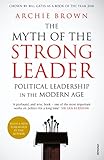The myth of the strong leader : political leadership in the modern age
Material type: TextPublication details: London Vintage 2018Description: xxiv, 470 pISBN: 9780099554851LOC classification: JC 330.3
TextPublication details: London Vintage 2018Description: xxiv, 470 pISBN: 9780099554851LOC classification: JC 330.3| Item type | Current library | Collection | Shelving location | Call number | Status | Notes | Date due | Barcode | Item holds |
|---|---|---|---|---|---|---|---|---|---|
 Book
Book
|
ICTS | Political | Rack No 01 | JC 330.3 (Browse shelf (Opens below)) | Available | Invoice no. IN 1081 ; Date 10-01-2019 | 01477 |
1. Putting leaders in context
2. Democratic leadershi: myths, powers, styles
3. Redefining leadership
4. Transformational political leadership
5. Revolutions and revolutionary leadershiop
6. Totalitarian and authoritarian leadership
7. Foreign policy illusions of 'strong leaders'
8. What kind of leadership is desirable?
In this magisterial and wide-ranging survey of political leadership over the past hundred years, Archie Brown challenges the widespread belief that strong leaders - those who dominate their colleagues and the policy-making process - are the most successful and admirable. Within democracies a collegial style of leadership is too often characterized as weakness and its advantages overlooked. Even in authoritarian regimes, a more collective leadership is a lesser evil compared with personal dictatorship where cultivation of the myth of the strong leader is often a prelude to oppression and carnage. 'Strong leaders' in democratic countries can do less harm, but here too the idea that one leader knows best and is entitled to take the big decisions is dangerous, even though overweening leaders in democracies are seldom as strong or independent as they purport to be. In reality, only a minority of political leaders make a big difference, by challenging assumptions about the politically possible or setting in motion systemic change. Yet in a democracy that is rare. It is especially when enlightened leaders acquire power in an authoritarian system that the opportunity for radical transformation occurs.


There are no comments on this title.